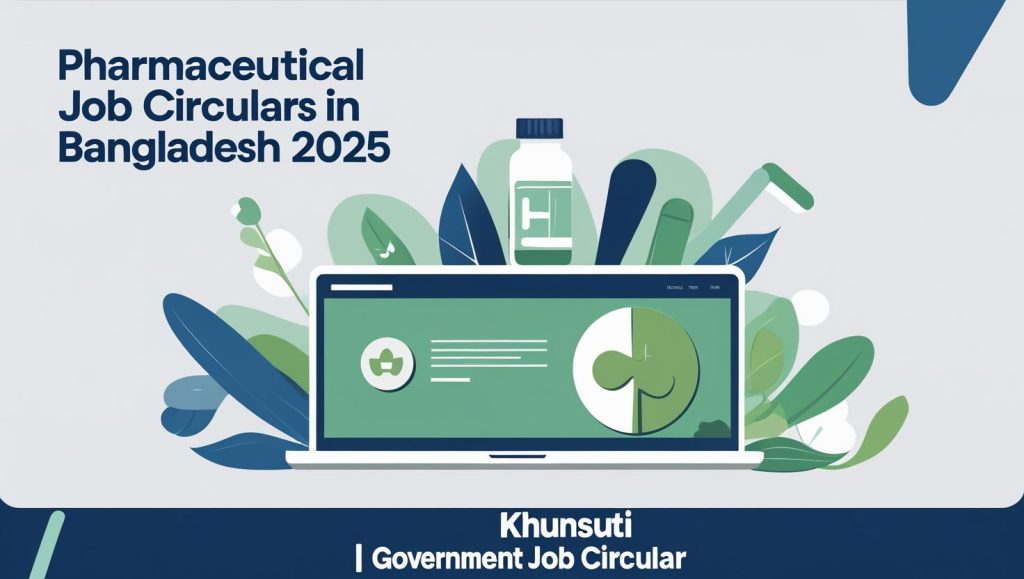The pharmaceutical industry in Bangladesh is expanding significantly, creating ample opportunities for job seekers. As we look ahead to 2025, a plethora of pharmaceutical job circulars will emerge, offering various positions across multiple sectors. This growth is largely driven by increasing healthcare demands, government incentives, and an emphasis on research and development. Let’s delve into what you can expect from these upcoming job circulars.
Employment Opportunities in the Pharmaceutical Sector
Pharmaceutical job circulars will cover a wide range of positions. Here are some of the key roles you might find:
- Research Scientists: Focus on developing new drugs and formulations.
- Quality Control and Quality Assurance Professionals: Ensure products meet regulatory and safety standards.
- Sales and Marketing Executives: Promote and sell pharmaceutical products to healthcare professionals.
- Regulatory Affairs Specialists: Manage compliance with industry regulations.
- Manufacturing Technicians: Oversee the production process in manufacturing facilities.
Skill Requirements
To thrive in the pharmaceutical sector, certain skills and qualifications are essential. Here are some of the necessary qualifications that job seekers should consider:
- Strong academic background in relevant fields such as Pharmacy, Chemistry, or Biology.
- Experience in research and development, particularly for research-oriented roles.
- Familiarity with statutory regulations and guidelines applicable in Bangladesh.
- Excellent communication skills for roles in sales and marketing.
- Attention to detail for ensuring quality standards.
Where to Find Pharmaceutical Job Circulars
Staying updated on job circulars is crucial for aspiring candidates. Here are some trusted sources where you can regularly check for the latest pharmaceutical job postings:
- BDJobs: A popular job portal in Bangladesh with extensive listings.
- Chakri: Offers a variety of job postings across multiple sectors, including pharmaceuticals.
- Pharma News Bangladesh: Provides industry news as well as job circulars specific to the pharmaceutical sector.
Expected Trends in 2025
As we approach 2025, several trends are expected to influence pharmaceutical job circulars:
| Trend | Description |
|---|---|
| Increased R&D Investment | More companies are allocating budgets to innovate and discover new drugs. |
| Digital Transformation | The adoption of technology in processes will require skilled IT and data professionals. |
| Focus on Compliance | As regulations evolve, the need for compliance experts will increase. |
| Growing Export Potential | Bangladesh’s pharmaceutical companies are expanding their markets globally. |
Preparing for Your Job Search
To transition smoothly into your desired role within the pharmaceutical industry, consider the following preparation tips:
- Update your CV and tailor it for each job application.
- Expand your professional network by connecting with industry professionals on platforms like LinkedIn.
- Participate in relevant training and workshops to enhance your skills.
- Stay informed about industry developments and advancements through available resources.
Securing a job in the pharmaceutical industry in Bangladesh requires preparation and the right skills. As 2025 approaches, the landscape will be ripe for talented individuals ready to take on the challenges of this dynamic field. Be proactive in your job search and leverage the resources available, and you will increase your chances of finding a rewarding position.
Key Skills and Qualifications Needed for Pharmaceutical Jobs

The pharmaceutical industry is booming, offering a wide range of career opportunities across various fields. As you seek a role in this dynamic sector, understanding the key skills and qualifications required can give you a significant advantage. Employers often look for a combination of educational credentials, technical skills, and soft skills. Here are some of the essential competencies you should focus on to secure a pharmaceutical job.
Educational Background
To start a career in pharmaceuticals, a relevant educational background is crucial. Here are some common degrees that pave the way into this field:
- Master’s or Bachelor’s Degree in Pharmacy (B.Pharm or M.Pharm)
- Biosciences, Chemistry, or Biochemistry
- Pharmaceutical Sciences
- Clinical Research or Drug Development
Technical Skills
In addition to your educational qualifications, technical skills play a central role in performing your tasks effectively. Here are some essential technical skills:
- Data Analysis: The ability to interpret and analyze clinical data is crucial for roles involved in research and development.
- Laboratory Skills: Practical experience in laboratory techniques like chromatography or spectroscopy is beneficial for R&D roles.
- Regulatory Knowledge: Familiarity with regulations set by organizations like the FDA or EMA is essential for compliance and quality assurance roles.
Soft Skills
While technical qualifications are essential, soft skills are equally important in the pharmaceutical sector. These interpersonal skills can set you apart:
- Communication: Strong verbal and written communication skills enable you to share complex information clearly with colleagues and stakeholders.
- Teamwork: The pharmaceutical industry thrives on collaboration, making the ability to work well in a team crucial.
- Problem-Solving: The capability to think critically and resolve issues quickly is a highly sought-after trait in this field.
Certifications and Continuous Learning
Obtaining professional certifications can enhance your resume and show your commitment to the field. Some valuable certifications include:
- Certified Pharmaceutical Industry Professional (CPIP): Validates your knowledge and skills in pharmaceutical operations.
- Good Clinical Practice (GCP) Certification: Ensures you understand the ethical and scientific requirements of conducting research.
Staying updated with industry trends through continuous learning demonstrates your dedication and adaptability. Consider attending workshops, conferences, and various training programs.
Networking and Professional Associations
Networking can open doors to various job opportunities in the pharmaceutical sector. Joining professional associations such as the American Pharmacists Association (APhA) or the Drug Information Association (DIA) allows you to connect with industry professionals and stay informed about current job openings.
Job Market Trends for Pharmaceutical Careers
The pharmaceutical job market is steadily evolving, with increasing demand for skilled professionals. Here are some trends to keep an eye on:
- Emphasis on Personalized Medicine: Understanding genetic factors to develop customized treatment plans.
- Digital Health Integration: Growing roles in telehealth and digital pharmaceuticals.
- Regulatory Changes: Staying updated on new regulations impacting the pharmaceutical landscape.
Job Search Strategies
Searching for pharmaceutical jobs requires strategy. Utilize resources wisely for effective results:
- Job Portals: Websites like PharmaceuticalJobs.com can help locate positions specifically in the pharmaceutical sector.
- Social Media: LinkedIn is a valuable platform for networking and discovering job openings.
- Recruitment Agencies: Partnering with agencies that specialize in pharmaceutical careers can provide additional support in your job search.
By acquiring the right qualifications, honing your skills, and actively networking, you can position yourself as a strong candidate for various roles in the pharmaceutical industry. Remember, the journey to securing a position may take time, but with dedication, you can achieve your career goals in pharmaceuticals.
The Growth of the Pharmaceutical Industry in Bangladesh

The pharmaceutical industry in Bangladesh has witnessed remarkable growth over the past few decades. As one of the fastest-growing sectors in the country, it has enhanced the economy while providing numerous job opportunities. The demand for pharmaceuticals has surged not only in Bangladesh but also in global markets, making it a vital contributor to the nation’s economy.
The sector began to grow significantly post-1982, following the introduction of the Drug Policy, which aimed to make essential medicines accessible. This policy paved the way for domestic production, leading to a more self-sufficient pharmaceutical market. Today, Bangladesh boasts a large number of pharmaceutical companies, enabling the nation to produce over 97% of its drug needs.
As of 2023, there are approximately 300 registered pharmaceutical companies operating in Bangladesh. All these companies focus on various therapeutic areas, including:
- Cardiovascular
- Anti-infectives
- Diabetics
- Oncology
- Gastroenterology
- Neurology
One of the key factors driving the growth of the pharmaceutical industry is the increasing healthcare awareness among the populace. As more people recognize the importance of health, the demand for medicines is on the rise. This growing awareness combined with a burgeoning population has contributed to the need for an extensive range of pharmaceutical products.
Additionally, the government of Bangladesh has played a crucial role in facilitating the growth of this sector. By establishing favorable policies, offering incentives, and enhancing regulatory frameworks, the government creates a conducive environment for both local and international companies. Some critical initiatives include:
- Tax Exemptions: Pharmaceutical companies receive tax holidays or reduced tax rates, encouraging investment.
- Investment in R&D: Support for research and development aims to drive innovation within the industry.
- Export Promotion: Government initiatives to promote exports help Bangladeshi companies expand their market presence.
To further bolster its position in the global market, Bangladesh’s pharmaceutical sector focuses on meeting international standards. This commitment allows local manufacturers to obtain WHO pre-qualifications and compliance with FDA standards. As a result, many Bangladeshi drugs are exported worldwide, particularly to the United States, Europe, and Africa.
This remarkable journey has also seen large firms emerge, dominating the market. Some of the notable players include:
| Company Name | Established | Main Products |
|---|---|---|
| Beximco Pharmaceuticals Ltd. | 1976 | Injectables, Antibacterials, and Anti-infectives |
| Incepta Pharmaceuticals Ltd. | 2004 | Biologics and Generics |
| Square Pharmaceuticals Ltd. | 1985 | OTC and Prescription Medicines |
Furthermore, the pharmaceutical job market is expanding rapidly as companies seek skilled labor to meet the demands of a competitive environment. Roles range from production to research and development, marketing, and regulatory affairs. With the industry projected to continue its upward trajectory, new professionals can look forward to various career opportunities.
Education is becoming increasingly important in this sector. Institutions across Bangladesh are offering specialized courses and programs tailored to meet the industry’s requirements. This focus on education ensures that the workforce is equipped with the skills necessary to keep up with technological advancements and evolving market needs.
The future of the pharmaceutical industry in Bangladesh looks promising, with continued growth expected. With advancements in biotechnology and research, the industry aims not only to cater to domestic needs but also to establish a stronghold in the international market. As companies expand their product offerings and enhance their operations, job opportunities will continue to flourish, making this sector a vital part of the Bangladeshi economy.
This growth presents an exciting opportunity for job seekers and professionals in Bangladesh. For more insights on the pharmaceutical industry, you can visit Bangladesh Pharmaceutical Industry and Ministry of Health and Family Welfare.
Tips for Job Applications in the Pharmaceutical Sector
Applying for jobs in the pharmaceutical sector can be competitive and challenging. To stand out in this industry, you need to present yourself effectively through your job applications. Here are some valuable tips that can help you succeed in landing a role in the pharmaceutical sector.
Understand the Industry
Before applying, take the time to research the pharmaceutical industry. This knowledge will help you understand the challenges and opportunities currently facing the sector. Familiarize yourself with key players in the market, recent developments, and industry trends. This will also enable you to tailor your application to highlight how your skills and experiences align with those trends.
Tailor Your Resume
Your resume is your gateway to the interview stage. Tailoring it to each position you apply for is essential. Here are some tips for an effective resume:
- Highlight Relevant Experience: Focus on your experiences that relate to pharmaceutical roles, such as internships, research projects, or jobs.
- Use Keywords: Incorporate specific keywords from the job description to pass through Applicant Tracking Systems (ATS).
- Keep It Concise: Stick to a one-page format unless you have extensive experience. Be clear and direct in your descriptions.
Write a Compelling Cover Letter
A cover letter allows you to showcase your personality and express why you are interested in the pharmaceutical role. Ensure you cover the following points:
- Show Passion: Explain why you chose the pharmaceutical sector and what motivates you.
- Connect the Dots: Relate your experiences to the job’s requirements, demonstrating how you can add value.
- Be Professional: Use a formal tone, and ensure there are no spelling or grammatical errors.
Network Effectively
Networking can open many doors in the pharmaceutical field. Elements to consider include:
- Attend Industry Events: Workshops, seminars, and conferences provide opportunities to meet professionals in the field.
- Leverage LinkedIn: Make connections with industry professionals, participate in discussions, and join relevant groups to expand your network.
- Informational Interviews: Conduct interviews with professionals to learn more about their roles and get advice on entering the industry.
Prepare for Interviews
Interviews can be daunting but being prepared can increase your confidence. Key preparations include:
- Research the Company: Understand their products, culture, and recent achievements to discuss during the interview.
- Practice Common Questions: Familiarize yourself with common interview questions for pharmaceutical positions.
- Prepare Your Questions: Asking questions demonstrates your interest in the role and the company. Prepare thoughtful questions to ask your interviewers.
Stay Updated on Regulations
The pharmaceutical industry is heavily regulated. Staying informed about relevant laws and regulations, such as those from the FDA, is crucial. This knowledge shows employers that you are serious about working in the field and understand the importance of compliance.
Utilize Job Boards and Recruiters
Many job boards specialize in opportunities within the pharmaceutical sector. Utilizing these resources can help significantly in your job search. Some recommendations include:
| Tip | Description |
|---|---|
| Tailor Resume | Customize each application to highlight relevant skills and experiences. |
| Write a Compelling Cover Letter | Show your passion and connect your experiences to the job requirements. |
| Prepare for Interviews | Research the company and practice common interview questions. |
By implementing these strategies, you can improve your chances of securing a position in the pharmaceutical sector. Remember that persistence is key; don’t be discouraged by rejection. Keep applying, networking, and enhancing your skills. Your opportunity in the pharmaceutical world awaits!
Future Trends in Pharmaceutical Employment Opportunities
The future of pharmaceutical employment opportunities is considerably dynamic, influenced by advancements in technology, regulatory changes, and shifting market demands. As the industry continues to evolve, professionals seeking careers in pharmaceuticals need to stay informed about the trends that will shape job availability and responsibilities in the coming years.
Emerging Technologies Shaping the Job Market
Technological innovations are at the forefront of creating new career pathways within the pharmaceutical sector. Notably:
- **Artificial Intelligence (AI):** AI is revolutionizing the drug discovery and development process by enabling faster analysis of complex data sets. This surge in AI adoption is creating jobs for data scientists and AI specialists.
- **Big Data Analytics:** Companies are increasingly leveraging big data analytics to enhance decision-making in clinical trials and market strategies. Skills in data analysis and statistical modeling are in high demand.
- **Telemedicine:** The rise of telehealth has transformed patient care and created new roles in medical consulting, technical support, and pharmaceutical marketing.
Regulatory Changes and Compliance
As regulations continue to evolve, there will be a burgeoning need for professionals who specialize in compliance and regulatory affairs. Keeping up with new laws, safety protocols, and ethical guidelines is essential. This trend presents opportunities for:
- **Regulatory Affairs Specialists:** These roles focus on ensuring that products meet all regulatory requirements, both domestically and internationally.
- **Quality Assurance Managers:** With an ever-increasing focus on drug safety, quality assurance roles are critical in maintaining high standards.
Greater Focus on Biotechnology
The biotechnology sector is growing rapidly, particularly in the areas of personalized medicine and gene therapy. As more companies invest in research and development, new roles are emerging:
- **Biotechnologists:** Professionals in this field work on innovation and application of biological systems and organisms to develop new products.
- **Clinical Research Associates:** They oversee clinical trials, adhering to ethical and regulatory guidelines while ensuring accurate data collection.
Globalization of the Workforce
The pharmaceutical industry is becoming increasingly global. Companies are no longer limited by geographical boundaries, providing opportunities for professionals willing to work in international settings. Global experience is highly valued, and roles in multinational companies are expanding in areas such as:
- **International Project Managers:** Overseeing projects across different countries requires strategic management skills and an understanding of various regulatory environments.
- **Global Marketing Specialists:** These roles develop marketing strategies that resonate with diverse cultural contexts, enhancing product reach around the world.
Remote Work and Flexibility
The COVID-19 pandemic has significantly altered the workplace landscape, and many companies are continuing to offer remote work options. This trend benefits employees by providing greater flexibility, resulting in:
- **Work-Life Balance:** Remote work opportunities can lead to improved job satisfaction and employee retention.
- **Access to Broader Talent Pools:** Companies can hire the best talent from various locations, regardless of geographic limitations.
Education and Upskilling
With the rapid changes in technology and market demands, continuous education and skills enhancement will be critical. Professionals should consider:
- **Online Courses and Certifications:** Programs focused on data science, regulatory affairs, and clinical research are gaining popularity.
- **Networking and Professional Organizations:** Joining organizations, such as the Pharmaceutical Society, can help individuals stay informed about trends and job openings.
Many resources are available to individuals looking for jobs in this industry. Websites such as Pharma Job Board and Pharmaceutical News frequently list openings and industry updates. Leveraging these platforms increases the chances of finding the perfect opportunity.
As you navigate the evolving landscape of the pharmaceuticals job market, staying informed, and continuously updating your skills will position you for success in an exciting and rapidly changing field. The future holds significant potential for those willing to adapt and innovate.
Conclusion
The pharmaceutical job circular for 2025 in Bangladesh presents a unique opportunity for aspiring professionals in a rapidly growing industry. Understanding the requirements, including key skills and qualifications, is essential for those looking to secure a position in this competitive field. With an emphasis on expertise in pharmaceuticals, biochemistry, and regulatory affairs, candidates can significantly enhance their employability.
As the pharmaceutical industry continues to expand in Bangladesh, driven by increasing local demand and international collaborations, job seekers can anticipate a wealth of opportunities. This growth not only highlights the need for specialists but also reflects the broader economic potential of the sector.
For those aiming to stand out in job applications, focusing on tailoring resumes, honing interview skills, and showcasing relevant experiences can make a substantial difference. Networking within industry circles and seeking internships or mentorships can further propel candidates toward successful careers.
Looking ahead, several trends will shape pharmaceutical employment in Bangladesh. The rise of biotechnology, digital health technologies, and a focus on research and development signify new roles on the horizon. As companies invest in innovation and education, staying informed and adaptable will be crucial for those seeking to thrive in this dynamic landscape.
By aligning your skills with industry needs and staying proactive in your job search, you can position yourself effectively for a fulfilling career in the pharmaceutical sector as it evolves over the next few years.



